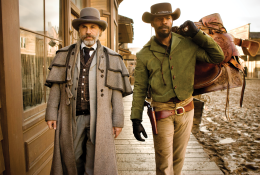 By Justin David Tate
By Justin David Tate
In a scene near the halfway point of “Django Unchained,” three dogs bark at a black slave hiding in a tree. A group of white men hold the leashes tightly to keep the dogs from running toward their prey.
His slavemaster, Calvin Candie, played with devilish intensity by Leonard DiCaprio, steps off his horse and carriage to ask his slave why he has run off. The slave is a mandingo, one meant to fight other slaves to the death for sport.
Calvin says he paid $500 for him to fight five fights. The slave has only fought three. Although he will likely die if he fights again, the concern of the slavemaster is not for the slave, but the value he can get for his money. This capitalistic disregard for humanity is a central theme of director/screenwriter Quentin Tarantino’s eighth movie, “Django Unchained.”
Movies about American slavery tend to wallow in the misery rather than the triumphs of their black characters. However, Tarantino’s film takes the subject of slavery and adapts it into the style of a Spaghetti Western, dubbing this genre a “Southern.”
Tarantino creates a fictional slave from Texas, Django, played by Academy Award-winner Jamie Foxx, and gives him a bounty-hunting German mentor, Dr. King Schultz, played by Academy Award-winner Christoph Waltz.
Schultz wants to find the Brittle Brothers, a trio of murderous siblings, and collect the bounty on their heads. Django is one of a select few who know what they look like. Schultz promises Django that he’ll give him his freedom if he helps him find the Brittle Brothers. After hunting them down, Schultz and Django develop a close friendship, and Schultz promises to take Django to rescue his wife from slavery. Their relationship provides the majority of the movie’s charm and humor.
Waltz plays a terrifically loony and off-kilter bounty hunter whose mad genius methods of conducting business are a sheer joy to watch. Foxx plays Django as stone-cold as possible, but injects plenty of subtle humor in Tarantino’s witty dialogue.
When asked if he likes the bounty-hunting business, Django replies, “You kill white folks and they pay you for it. What’s not to like?”
Two performances that stood out were DiCaprio’s portrayal of Candie and Samuel L. Jackson’s transformation into the role of Candie’s loyal Uncle Tom-esque slave, Stephen.
DiCaprio gives a speech during the latter part of the film about a former slave named Ben to support his argument on the superiority of the white race. It’s the type of speech that actors love to get their hands on, if only to utter Tarantino’s superbly written dialogue, and DiCaprio clearly relishes every minute of it.
Jackson is an instant scene-stealer upon his introduction near the end of the film. His relentless dehumanization of his own race is a marvel to watch, even as it causes the audience to audibly curse at such a wicked individual on the screen.
Jackson said during pre-release interviews that if he had done his job correctly, “hopefully I’ll become the most hated Negro in cinematic history.”
Judging by the audience’s reaction, Jackson did exactly that, and a Best Supporting Actor Oscar should not elude him this year, as it has in the past.
The film is very violent, cartoonishly so in the final scenes. The campy amount of blood that paints the walls of the final shootouts only adds to the hilarity as victims don’t just die, they get repeatedly shot through the knee, chest and private parts, surviving long enough to keep screaming in agony. The audience can only laugh at the ridiculous amount of misfortune the gunslingers must endure.
Overall, this bloody tale of revenge is Tarantino’s most crowd-pleasing effort to date and well worth the price of admission when it opens on Christmas Day. I rate this film 5 plantations out of 5.







